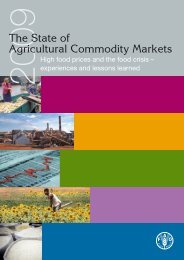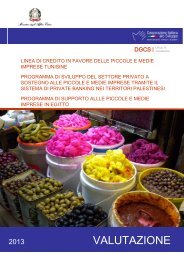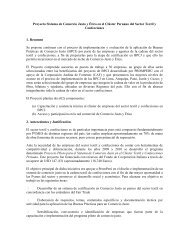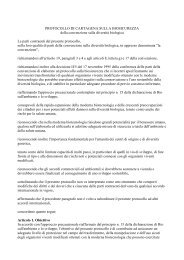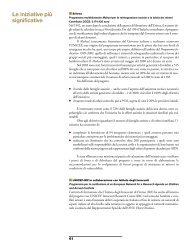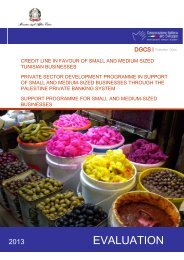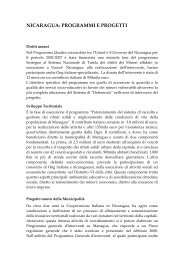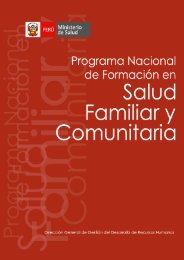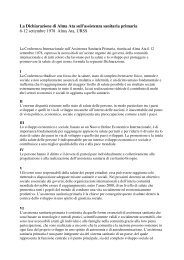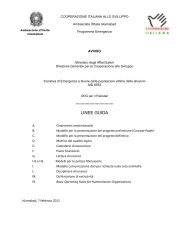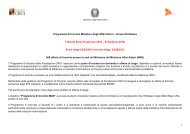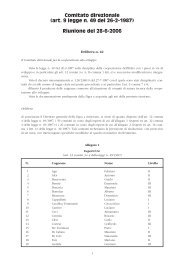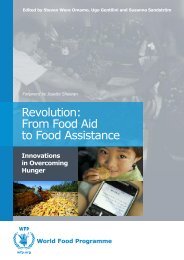In the case of the girls having more cultural instruments, nearer to the westernculture, above all those who pursue a migratory project of an individual type, onecan see clearly the role of the “anticipated socialisation” 86 to the values and modelsof Western life and consumption. In the others, the impact with the West is moretraumatic and it is more evident the difficulty to find the road to adapt, at leastpartially, to the given situation, once arrived in our territory.In any case the individual resources (intelligence, capacity to resist, autonomy,etc.) do not seem to play a secondary role in delineating the paths and means of“going through” and overcoming the matters connected to the return of the debtand to cultivate and carry out the plans for the successive phase of its extinction.At the same time the Nigerian girls and women seem, as a whole, to have somecharacteristics which mark in a peculiar manner, in relationship with other cultures,the way to stay in the situation, or to discover and cultivate projects for“emancipation” (in the sense of reproducing the mechanism of exploitation towardsnew victims or the autonomous placement in a different dimension of life).4. The “hooking” mechanisms have been widely described in the research.Normally it occurs within the framework of family relations, of a close or extendedtype, or in the context of the network of relations and ties that unite the group thatshares the ethnic origins, the rules and the significance of the relations of acommunity type. This is important both for the role that the family has in theorientation and ripening of the decision to depart, as well as for the value of thepledge of the agreed pact to <strong>allo</strong>w its concrete accomplishment.The role of the close and/or extended family is to be found, as in other cases ofmigration of the youngest members of this group and their start in prostitution, in acontinuum that contains different possible positions:the family participates actively in the recruitment with a view to placing thegirl on the market of prostitution, to ensure the necessary income once theenrichment objectives have been reached, being aware of, if not directlyimplicated, in the activity of the management of the traffic and exploitation ofprostitution;the family is forced to agree to such a situation, even if aware of the risks forthe family member, out of desperation or for a condition of being of serviceto a specific individual or groups, for example to liberate themselves from adebt or to not put up with threats or retaliation;confronting their existence with that of others considered more important, whose style of life andconsumption one knows at first hand or indirectly. The expression counter proposed is “absolutedeprivation”, which commutates the condition of one who does not have the possibility to guaranteemeans of subsistence for herself and her family.86For “anticipated socialisation” it is intended that process of pre-socialisation to cultural models andstyles of life of countries which are looked at as places for migration, which comes in the phase whichprecedes the migratory path and the contents of which are in part available in the media, in part from theexultant accounts of those who have had the experience.
the family entrusts their own children to others without a clear knowledge ofthe consequences and forms of work and exploitation to which they will besubjected, moved only by the hope of redemption from economic difficulties;the family has lost its “grip” on (or has entered into conflict with) the girlwho ends up breaking the relationship and goes away on her own, makingreference to other adult persons or to “equals” also in difficulty.5. In any case, the choice made by the family cannot be isolated from theextended context in which it is situated. In the case of the family of Nigerianvictims, the context which determines the horizon of possible choices ischaracterised, in general, by serious economic problems, by the almost absoluteabsence of opportunities of actualisation and development, whether economic orsocial, if not by having recourse to some “extraordinary” means.To these should be added such elements as: the models of life and consumption imposed on a “global” scale, that feedsentiments of relative deprivation in adults, and adolescents; the break in some traditional models of regulation of relationships within theethnic group, the community, the extended and close family: the contactswith models of “westernised” life, the family nucleus, no longer protected bythe mechanisms on which its own stability was founded, are destroyed withserious consequences above all for women and children; the conception according to which the children (and daughters in particular) -at different age, but in general more precociously than in western societies -have to undertake precise economic obligations for the family, that is to saythey must play an important role in the search for means of sustenance forthemselves and for the family.6. Research has highlighted with sufficient clarity how the grades and contentsof understanding of what is the destiny and the future in Italy for those whoundertake the journey appear quite variable, depending on whether the girl and herfamily have more or less access to information on returning immigrants or thewidely spread information in the contexts w<strong>here</strong> young women have departed forItaly since a long time.The deception can be absolute or relative, it can t<strong>here</strong>fore go from the offer ofprospects without any foundation (in the case for example of proposals to girls thatlive in a geographically marginal context and culturally more isolated), to forms ofpresentation of the possibilities for getting rich that implicitly refer to modelsdifferent from “honest” types, underlining the facility to earn if one is disposed topledge oneself, without taking the details into account.This feeds, in the girls who are more aware of the reality lived by thecompanions that preceded them, the need for self-deception, which assumes theform of considering themselves a possible “exception” regarding the commondestiny or to think that some alternatives are possible, once arrived in Europe oreven, perhaps to be able to conciliate the obligations which one will have.
- Page 1:
TRAFFICKINGOF NIGERIAN GIRLSTO ITAL
- Page 5 and 6:
F O R E W O R D1. Objectives and st
- Page 7 and 8:
and who have identified the most si
- Page 9 and 10:
on the other hand, for those involv
- Page 11:
Case files analysed: Preventive det
- Page 15 and 16:
Table 2 - Socio-economic situation
- Page 17 and 18:
Table 3 - Nigerian citizens regular
- Page 19 and 20:
Table 5 - Social protection permiss
- Page 21 and 22:
Table 7 - Number of persons charged
- Page 23 and 24:
Table 8 - Detainee population sub-d
- Page 25 and 26:
and the United States enables this
- Page 27 and 28:
C H A P T E R IW a y s a n d p h a
- Page 29 and 30:
Figure No.2 - Edo State.It is not c
- Page 31 and 32:
Nigeria. From 1996 in Benin City an
- Page 33 and 34:
In this variegated framework, the d
- Page 36:
“Benin City is one of those State
- Page 39 and 40:
Various privileged witnesses of the
- Page 41 and 42:
In the first years of the traffic o
- Page 43 and 44:
pay considerable sums for lodging,
- Page 45 and 46:
The routesWe find at least three ty
- Page 47 and 48:
Figure No.5 - Trafficking routes th
- Page 49 and 50:
The journey overland through Africa
- Page 51 and 52:
new dispositions and contacts to co
- Page 53 and 54:
Then he sends her in a taxi to the
- Page 55 and 56:
T. remains in this house for 21 day
- Page 57 and 58:
detainees go towards the refectory,
- Page 59 and 60:
At this point the organisation esco
- Page 61 and 62:
was accepted by the Ivory Coast pol
- Page 63 and 64:
B.E. «Yes, I was given a Ghanaian
- Page 65 and 66:
Now the documents are “hired”:
- Page 67 and 68:
It is understood however that the v
- Page 69 and 70:
“There is no Nigerian passport wh
- Page 72 and 73:
C H A P T E R I VL i v i n g a n d
- Page 74 and 75: have no shop and then there is no p
- Page 76 and 77: The cost to manage the house and th
- Page 78 and 79: mine since a long time, he can’t
- Page 80 and 81: A feminine managementIn analysing t
- Page 82 and 83: “There are many pimps that when y
- Page 84 and 85: The control of movementThe fact tha
- Page 86 and 87: Physical punishments can be made by
- Page 88 and 89: Control between psychological subje
- Page 90 and 91: arms), tortured in many different f
- Page 92 and 93: C H A P T E R VT h e o r g a n i s
- Page 94 and 95: Each penal procedure on the subject
- Page 96 and 97: Often it is the same madam who move
- Page 98 and 99: Even in numerous recent criminal pr
- Page 100 and 101: work arrangements (…) persons tha
- Page 102 and 103: man all the money she had in the ho
- Page 104 and 105: in the plates and everything and th
- Page 106 and 107: exploitation) has reached an amount
- Page 108 and 109: C H A P T E R V IT h e e n d o f t
- Page 110 and 111: A: «You have to bring me a present
- Page 112 and 113: Often the family is however not abl
- Page 114 and 115: the different evaluations of the as
- Page 116 and 117: The discussions on the possibility
- Page 118 and 119: eal results: to distance herself fr
- Page 120 and 121: of a different culture is very impo
- Page 122 and 123: C H A P T E R V I IC o n s i d e r
- Page 126 and 127: As has been many times noted, the c
- Page 128 and 129: under the profile of the “quality
- Page 130 and 131: person to obtain either relevant re
- Page 132 and 133: Numerous are the criminal juridical
- Page 134 and 135: If the accused claims to not knowin
- Page 136 and 137: sanctions, sometimes, also in prese
- Page 138 and 139: d) Investigative and judiciary co-o
- Page 140 and 141: The reform foresees, under Art. 1,
- Page 142 and 143: which the woman can definitively tu
- Page 144 and 145: witnesses, social operators - agree
- Page 146: and necessary, therefore, to think
- Page 149 and 150: in many cases they are driven to th
- Page 151 and 152: Melossi, D., (2002), “Le teorie s



